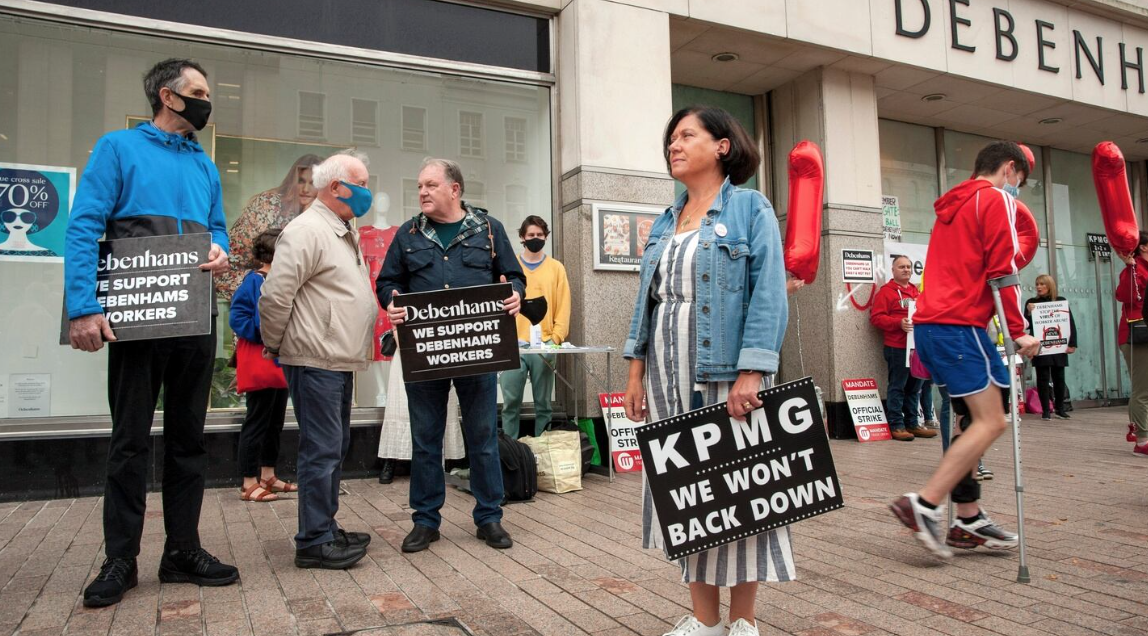On Friday the High Court overturned a ruling of the Labour Court that awarded Debenhams workers four weeks pay in compensation for the failure of the company to consult with them before they were made redundant. The award amounted to a miserly €1,140 per worker.
BACKGROUND
In April 2020, Debenhams informed workers by email that the company was going into liquidation and that it would not be reopening its Irish shops. The former Debenhams workers started a picket outside the shops to seek a fair redundancy package. This picket lasted for over 406 days, demanding four weeks’ of redundancy settlement per year of service as had been agreed previously by Debenhams.
The picket came to an end after large Garda operations dragged the former Debenhams workers off picket lines so the liquidator, KPMG, could remove stock. If anyone had any illusions that the state is a neutral actor in industrial relations it was shattered then. This judgement proves yet again whose side the state is on.
The law requires employers to consult with workers who are being made redundant in good time and at the earliest opportunity. Such consultation should be meaningful and take place at least 30 days before the first notice of dismissal is given. Those consultations are intended include the possibility of avoiding the proposed redundancies, reducing the number of employees affected by them or mitigating their consequences by redeploying or retraining employees made redundant. The purpose of the consultation should be to reach an agreement with the representative of the workers, ie their trade union.
The Debenhams workers received an email on April 8th saying that basically their jobs were gone as the company was already seeking to appoint a liquidator. Union reps were not met until April 17th , after the liquidator was appointed. When the meeting happened the union reps were presented with a fait accompli. At that stage, as the Labour Court put it, the company had 'limited the options available in terms of coming to an agreement' with the union.
There is no doubt in this judgment that the consultation period should have started on the 9th as there was no doubt at that stage that redundancies were inevitable. One company representative admitted that that there had been 'radio silence' in terms of communication between Debenhams and the workers from 9 April 2020, when the employees had received the letter, to 17 April 2020, when the meeting finally happened. The judgement makes clear that this happened in spite of the fact that Debenhams was well aware of its legal responsibilities to provide notice earlier. Yet the judge lets Debenhams off the hook.
A BAD BIASED PRECEDENT
Firstly, he says that events took place during Covid and over the Easter Holidays. So Debenhams controlled when the announcement of redundancies was made but now argue that circumstances beyond their control (Easter and Covid) justified delays in proper consultation. This sets a very bad precedent for companies seeking to avoid their legal obligations. They can now choose to time a major announcement in a way that limits employees’ ability to react, and then later use those same circumstances to avoid legal consequences.
Secondly, he argues that really there was nothing Debenhams could do. He argues that it was insolvent,, had few assets, and massive debt. Although the email from the company on April 9th was devastating for the workers there was nothing the company could do to help them. His class prejudice is displayed when he says that the workers suffered no 'additional distress' due to the lack of consultation. Is he for real? Workers were in the midst of a global pandemic, being told they were out of a job and were not given any information by the company yet are deemed to be not suffering distress. This judge will never find himself in this situation so how would he know?
PUT WORKERS FIRST
The workers' situation could have been mitigated by using monies raised from selling the remaining stock to meet their demand for 4 weeks redundancy pay. The company (and probably the judge too) would argue that this was not possible because, under current liquidation law, workers are near the end the queue when it comes to paying off creditors. Mick Barry introduced The Debenhams Bill in the last Dáil to reverse this and put workers to the front in liquidations. People Before Profit TDs will be pushing to ensure it is passed.
